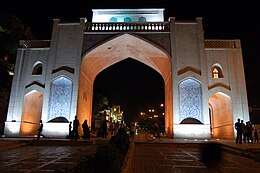Qur'an Gate: Difference between revisions
mNo edit summary |
mNo edit summary |
||
| Line 6: | Line 6: | ||
==History== |
==History== |
||
The Gate was first built during the reign of [['Adud ad-Dawla]]. By the time of the [[Zand dynasty]], it had sustained a lot of damage, so it was restored and a small room on top was added, in which were kept hand-written Qur’āns by [[Sultan Ibrahim Bin |
The Gate was first built during the reign of [['Adud ad-Dawla]]. By the time of the [[Zand dynasty]], it had sustained a lot of damage, so it was restored and a small room on top was added, in which were kept hand-written Qur’āns by [[Sultan Ibrahim Bin Shahrukh Gurekani]]. The two Qur’āns are known as Hifdah-Man.<ref name="shirazcity.org"/> Travellers passing underneath the gates were believed to receive the blessing of the Holy Book as they began their trip or journey from Shiraz. |
||
During the [[Qajar dynasty]], the gate was damaged by multiple earthquakes; it was later restored by Mohammad Zaki Khan Nouri.<ref name="shirazcity.org"/> In 1937 the two Qur’āns were taken from the gate and were taken to the Pars Museum in Shiraz, where they remain today. In 1949 the arch of the gate was restored by Hosein Igar, a merchant also known as E'temad Al-Tejar.<ref name="shirazcity.org"/> |
During the [[Qajar dynasty]], the gate was damaged by multiple earthquakes; it was later restored by Mohammad Zaki Khan Nouri.<ref name="shirazcity.org"/> In 1937 the two Qur’āns were taken from the gate and were taken to the Pars Museum in Shiraz, where they remain today. In 1949 the arch of the gate was restored by Hosein Igar, a merchant also known as E'temad Al-Tejar.<ref name="shirazcity.org"/> |
||
Revision as of 21:40, 6 April 2009

Qur’ān Gate (Persian: دروازه قرآن, Darvāzeh Ghor'ān) is a historic gate in the southern-central Persian city of Shiraz.
Location
Darvaze Qur’ān is located at the northeastern entrance of Shiraz on the way to Marvdasht and Isfahan, between Baba Kouhi and Chehel Magham Mountains near Allah-O-Akbar Gorge.[1]
History
The Gate was first built during the reign of 'Adud ad-Dawla. By the time of the Zand dynasty, it had sustained a lot of damage, so it was restored and a small room on top was added, in which were kept hand-written Qur’āns by Sultan Ibrahim Bin Shahrukh Gurekani. The two Qur’āns are known as Hifdah-Man.[1] Travellers passing underneath the gates were believed to receive the blessing of the Holy Book as they began their trip or journey from Shiraz.
During the Qajar dynasty, the gate was damaged by multiple earthquakes; it was later restored by Mohammad Zaki Khan Nouri.[1] In 1937 the two Qur’āns were taken from the gate and were taken to the Pars Museum in Shiraz, where they remain today. In 1949 the arch of the gate was restored by Hosein Igar, a merchant also known as E'temad Al-Tejar.[1]
Today the gates are part of a city park where Shirazis relax and picnic during their leisure hours.
References
- ^ a b c d Shiraz Municipality
External links
